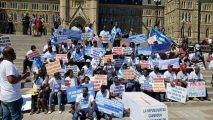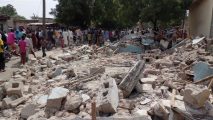Categories
Recent Posts
- CPDM Covid Scandal: Prosecutor seeks 10-Year ban for 4 officials
- Cameroon still faces power cuts despite full output from Nachtigal Dam
- Financial scandal rocks Mkpot Oil Mill Project!! Manyu Chiefs won’t talk
- Yaoundé: Defense Ministry says “Clear Alliance” between Boko Haram and criminals in recent attack
- Football: MTN Elite One resumes after boycott threats
Archives
- March 2025
- February 2025
- January 2025
- December 2024
- November 2024
- October 2024
- September 2024
- August 2024
- July 2024
- June 2024
- May 2024
- April 2024
- March 2024
- February 2024
- January 2024
- December 2023
- November 2023
- October 2023
- September 2023
- August 2023
- July 2023
- June 2023
- May 2023
- April 2023
- March 2023
- February 2023
- January 2023
- December 2022
- November 2022
- October 2022
- September 2022
- August 2022
- July 2022
- June 2022
- May 2022
- April 2022
- March 2022
- February 2022
- January 2022
- December 2021
- November 2021
- October 2021
- September 2021
- August 2021
- July 2021
- June 2021
- May 2021
- April 2021
- March 2021
- February 2021
- January 2021
- December 2020
- November 2020
- October 2020
- September 2020
- August 2020
- July 2020
- June 2020
- May 2020
- April 2020
- March 2020
- February 2020
- January 2020
- December 2019
- November 2019
- October 2019
- September 2019
- August 2019
- July 2019
- June 2019
- May 2019
- April 2019
- March 2019
- February 2019
- January 2019
- December 2018
- November 2018
- October 2018
- September 2018
- August 2018
- July 2018
- June 2018
- May 2018
- April 2018
- March 2018
- February 2018
- January 2018
- December 2017
- November 2017
- October 2017
- September 2017
- August 2017
- July 2017
- June 2017
- May 2017
- April 2017
- March 2017
- February 2017
- January 2017
- December 2016
- November 2016
- October 2016
- September 2016
- August 2016
- July 2016
- June 2016
Featured
Most Commented Posts
 4 Anglophone detainees killed in Yaounde
4 Anglophone detainees killed in Yaounde
18 comments Chantal Biya says she will return to Cameroon if General Ivo Yenwo, Martin Belinga Eboutou and Ferdinand Ngoh Ngoh are sacked
Chantal Biya says she will return to Cameroon if General Ivo Yenwo, Martin Belinga Eboutou and Ferdinand Ngoh Ngoh are sacked
13 comments The Anglophone Problem – When Facts don’t Lie
The Anglophone Problem – When Facts don’t Lie
12 comments Anglophone Nationalism: Barrister Eyambe says “hidden plans are at work”
Anglophone Nationalism: Barrister Eyambe says “hidden plans are at work”
12 comments Largest wave of arrest by BIR in Bamenda
Largest wave of arrest by BIR in Bamenda
10 comments
Latest Tweets
Featured
-

CPDM Covid Scandal: Prosecutor seeks 10-Year ban for 4 officials
-

Cameroon still faces power cuts despite full output from Nachtigal Dam
-

Financial scandal rocks Mkpot Oil Mill Project!! Manyu Chiefs won’t talk
-

Yaoundé: Defense Ministry says “Clear Alliance” between Boko Haram and criminals in recent attack
-

Football: MTN Elite One resumes after boycott threats
-

Biya’s election season stirs renewed anxiety in Southern Cameroons
-

Revealed: Boko Haram fighters kill 20 Cameroonian troops
© Cameroon Concord News 2025





9, October 2024
Poverty Culture: Several Francophone political leaders urging Biya to run in 2025 0
Several political leaders have called on the president to seek a new mandate in the 2025 election, despite persistent concerns about his health.
As with every presidential election in Cameroon, the calls for Paul Biya to run again—now 91 and facing many questions about his health—are multiplying. The leaders of the Cameroon People’s Democratic Movement (RDPC, the ruling party) began these efforts as early as 2023, but now the movement is spreading to smaller allied parties.
On October 6, the Democratic Movement for the Defence of the Republic (MDR) made its move. At a special convention in Maroua (Extreme North region), the MDR announced that it would keep to its long-standing policy of supporting the president.
“Implementation of Congress Recommendations”
“Remaining true to the path set by its founder, the late Dakolé Daïssala, the MDR will continue to back President Paul Biya’s candidacy in the 2025 election,” said a resolution signed by its president, Senator Paulin Djorwe. “We are preparing calmly. The party is ready. We are urging our supporters to follow this direction,” added the lawyer, who was officially installed as the new leader after serving two years as interim.
A few days earlier, another call for Biya’s candidacy came from the Union of the Populations of Cameroon (UPC) in Yaoundé.
After an October 4 meeting between Minister of Territorial Administration Paul Atanga Nji and Robert Bapooh Lipot, who leads one faction of the historically divided UPC, Lipot said his party would support Biya in 2025. “We are carrying out the congress’s recommendations and honouring the commitments made by our late Secretary-General, Augustin Frederic Kodock, to support the man who made sure our heroes, Ruben Um Nyobe, Ernest Ouandié, Abel Kingué… are celebrated in this nation,” he added.
Battle of Coalitions
The MDR and the Lipot-led UPC are both part of the ruling majority. The MDR aligned with Paul Biya’s RDPC after the March 1992 legislative elections. Defeated by the opposition that year, the ruling party gained a majority only after the MDR’s six deputies joined them. That same year, the MDR entered the government, securing four ministerial posts.
The UPC joined a few months later. After tough negotiations with its then-Secretary-General Augustin Frederic Kodock, it also joined the government in October 1992, gaining four ministries and a position as Minister of State in 1994. However, decades later, both parties have greatly weakened.
Hampered by internal infighting, both the MDR and UPC have lost much of their influence. In the 2020 legislative elections, the MDR managed only one seat, while the UPC was barred from running due to its divisions. Nevertheless, these parties remain symbolic, and the RDPC continues to rely on them to promote its policy of inclusiveness. In 2018, the ruling party leaned heavily on the support of the G20—a coalition of allied parties—to counter the opposition, particularly the campaign of Maurice Kamto.
Who will mobilise more this time? As the next elections approach, the battle for coalition support has resumed in full force.
Culled from The Africa Report